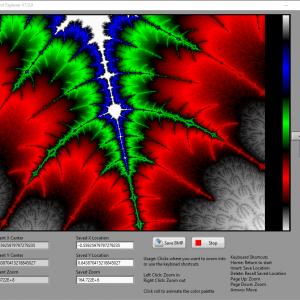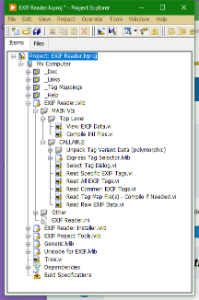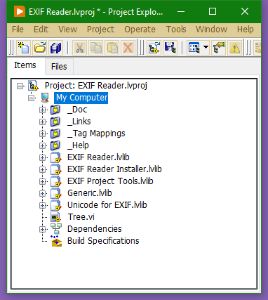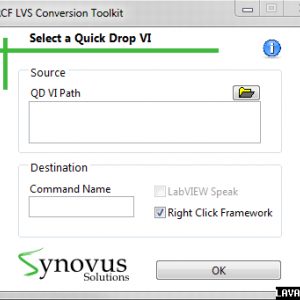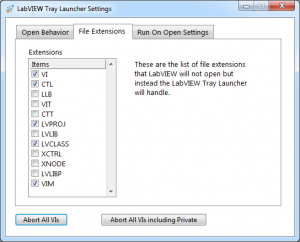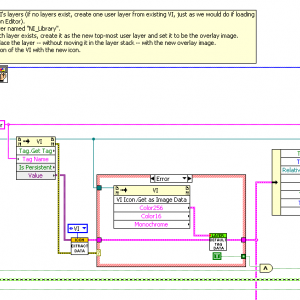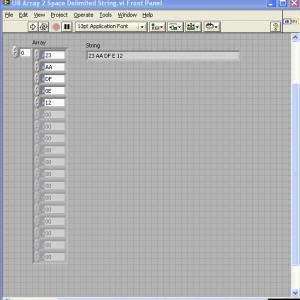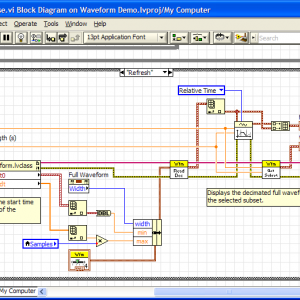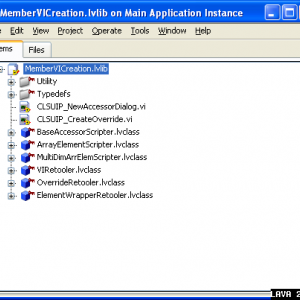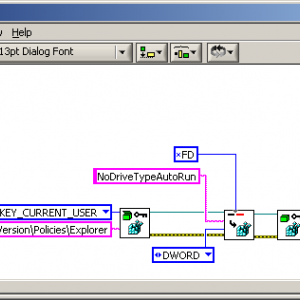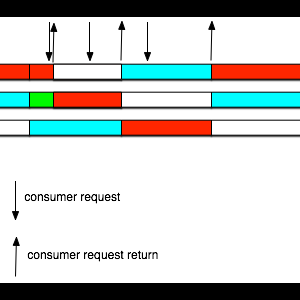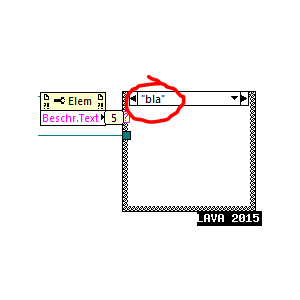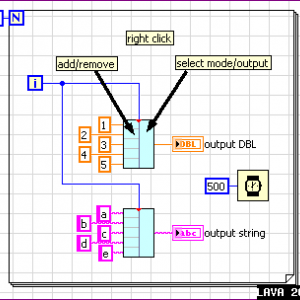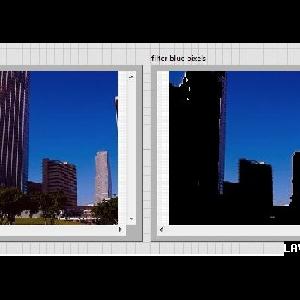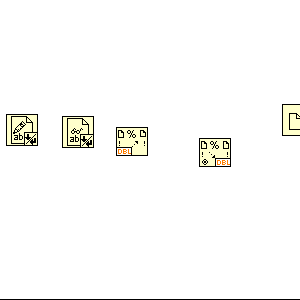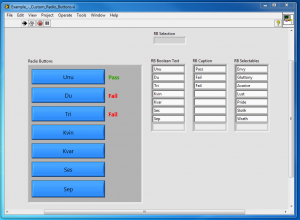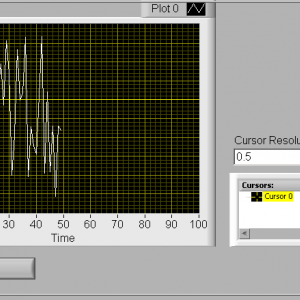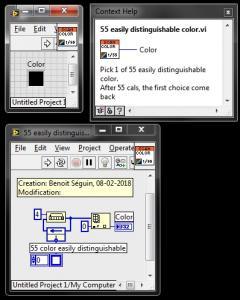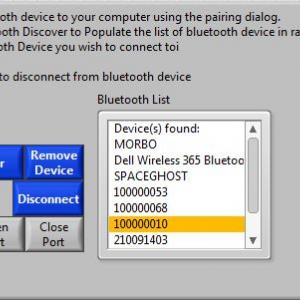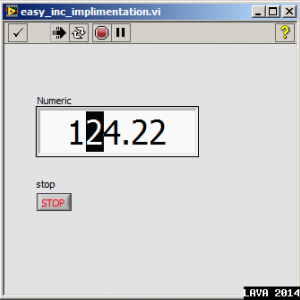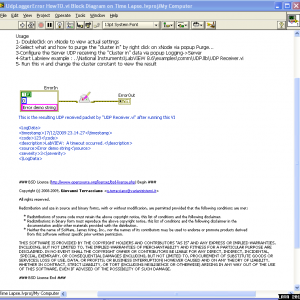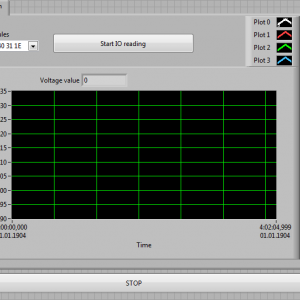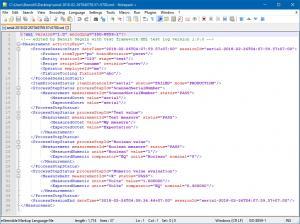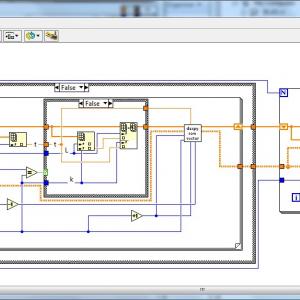*Uncertified*
Post code here that is not ready for certification. Once it is ready for certification please notify the moderators. It will then be moved to the proper category.
78 files
-
Mandelbrot Explorer
By CopperD
Simple Mandelbrot explorer that I wrote a few years ago.
Features
Many predefined color pallets
Rolling color pallet to produce motion effect
Ability to customize the color pallet
Log color mapping
Keyboard or mouse control
Basic shortcut keys
Saving high res images
Needed improvements
Clustering to clean up code more
Save settings
Operation
Load project in LabVIEW 2015 32/64 bit
Start program using Mandelbrot Main.vi
213 downloads
- mandelbrot
- fractal
- (and 1 more)
Submitted
-
Submitted
-
Submitted
-
RCF LVS Conversion Toolkit
Hi Everyone,
We have recently developed a toolkit that allows you to use Quick Drop plugins in Right Click Framework or LabVIEW Speak platforms.
Named RCF LVS Conversion Toolkit, this toolkit provides an easy solution for JKI Right Click Framework (RCF) and LabVIEW Speak (LVS) lovers who want to use a quick drop plugin in RCF or LVS. Now, you wont be disappointed when you see a useful plugin not written in your favorite platform's plugin format.
Procedures are simple:
Open the toolkit by going to Tools Menu >> Synovus >> RCF LVS Conversion Toolkit...
Select the target Quick Drop plugin VI
Type the command name in Right Click Framework or LabVIEW Speak
Click OK
Now you can use the Quick Drop plugin in Right Click Framework or LabVIEW Speak platform
Features:
Automatically converts a QD plugin to RCF or LVS plugin format
Warns the user if repetitive commands are installed.
Provides an instruction as user clicks help button.
Helps the user navigate to the plugin folders (LVS, QD and RCF)
Modifying the functionality in Quick Drop VI will automatically update the functionality in Right Click Framework or LabVIEW Speak
Please let me know if you have any questions. Suggestions and comments are welcome
Note: RCF and LVS only update their lists of commands at startup. If you use the RCF LVS Conversion Toolkit when RCF and LVS are open, please restart these platforms.
128 downloads
- right click framework
- quick drop
- (and 2 more)
Submitted
-
LabVIEW Tray Launcher
By hooovahh
This application is designed to help manage a system, that has multiple versions of LabVIEW installed. It does this by adding an icon in the system tray for launching any version of LabVIEW installed. This may work with 64-bit versions of LabVIEW but it has never been fully tested. It has several other features which are useful when having multiple versions of LabVIEW installed.
Launch any version of LabVIEW installed from the system tray icon. Kill or restart any version of LabVIEW running from the system tray icon. Abort all VIs running in all versions of LabVIEW from the system tray icon. (not asynchronous clones at the moment) Abort all private context VIs from the settings dialog found by double clicking the system tray icon. (not asynchronous clones at the moment) Control what version of LabVIEW is used on opening a VI or LabVIEW file. (File Extension support in the configuration dialog) Configuration can chance the behavior of this but by default it will ask what version of LabVIEW to open a VI in if more than one version can open it. By default a VI set to Run On Open will always ask what version, and if you would like to run it on open or just open it. Shift can be held when opening a VI to always be asked what version to use. CTRL can be used to select the default option which is generally the last version used. By default if only one version of LabVIEW is running, and it can open the VI, then it will be opened in that version. Other file extensions can be selected after the install. Read the Readme Usage for more information on how this works. For this software to function properly, at least one LabVIEW Run-time, or development needs to be installed which is version 2011 or newer. The source includes all versions from 2011 to 2017. The installer includes the builds from all versions 2011 through 2017. An AutoIt script and source are included which selects the right EXE based on what version of the run-time engine are installed. This is why multiple versions are included in the installer.
Also for VI Server functions to work properly each version of LabVIEW needs to be configured to have TCP/IP configured and a unique port. This is all done automatically through VIPM so my suggestion is to configure all versions of LabVIEW through VIPM, at which point this tool should work. Some features of this will work without this enabled but not all of them.
This is the LabVIEW Tray Launcher, originally discussed and developed in 2009 here.
A fully built installer for version 1.5.0 can be found here. Just download the installer and run it. It should add all the needed files to the Program Files directory, and edit the registry if you allow it during the install.
167 downloads
Submitted
-
Library And Class Icons
By jgcode
Library and Class Icons v1.0
Copyright © 2010, Jonathon Green; JGCODE
All rights reserved.
Author: Jonathon Green
LAVA Name: jgcode
Contact Info: Contact via PM on lavag.org
LabVIEW Versions:
LabVIEW 2010 only
Dependencies:
None
Description:
This package contains code posted on NI Forums by NI that applies a fix to the VIs in the Enhanced Icon Editor. VI passwords have been removed!
This fix is for LabVIEW 2010 only.
This package will install files to the labVIEW 2010\resource\plugins\NIIconEditor\Support folder
On uninstall the original files will be re-installed.
See here and here to view original document and post by AQ.
Installation and instructions:
Install package using VIPM.
Examples:
No examples.
Known Issues:
No known issues.
Acknowledgements:
Aristos Queue
Version History (Changelist):
1.0-1 2010 08 28
- New (): Initial public release of the code (LabVIEW 2010)
License:
Copyright © 2010, National Instruments
Support:
If you have any problems with this code or want to suggest features:
please go to lavag.org and navigate to LAVA > Resources > Code Repository (Certified) and search for the Library and Class Icons support page.
Distribution:
This code was downloaded from the LAVA Code Repository found at lavag.org
406 downloads
Updated
-
U8 Array 2 Space Delimited String
"Converts U8 Array into Space Delimited String".. This is a very simple code but often times very handy when you are in a hurry writing your code and want to finished asap. Description: it will convert a u8 hex array into a space delimited hex string. please let me know if you have concern or question regarding this LabVIEW code. Autthor: Sherwin Tiongson..
775 downloads
Updated
-
Waveform Class
By cvis
LabVIEW Versions:
2010 SP1
Dependencies:
None
Description:
This is a reference based class for handling waveform data. The waveforms are pre-allocated for faster access. Methods allow you to append new waveforms, read the existing waveforms, read a subset of the existing waveforms, or read a decimated copy of the existing waveforms.
453 downloads
Updated
-
Updated
-
New Accessors
By jgcode
New Accessors v1.0
Copyright © 2010, Jonathon Green; JGCODE
All rights reserved.
Author: Jonathon Green
LAVA Name: jgcode
Contact Info: Contact via PM on lavag.org
LabVIEW Versions:
LabVIEW 2010 only
Dependencies:
None
Description:
This package contains code posted on NI Forums by NI that applies a fix to the New Accessors folder. All VI passwords have been removed!
This fix is for LabVIEW 2010 only.
This package will install files to the labVIEW 2010\resource\Framework\Providers\LVClassLibrary\NewAccessors folder
On uninstall the original files will be re-installed.
See here and here to view original document and post by AQ.
Installation and instructions:
Install package using VIPM.
Examples:
No examples.
Known Issues:
No known issues.
Acknowledgements:
Aristos Queue
Version History (Changelist):
1.0-1 2010 08 28
- New (): Initial public release of the code (LabVIEW 2010)
License:
Copyright © 2010, National Instruments
Support:
If you have any problems with this code or want to suggest features:
please go to lavag.org and navigate to LAVA > Resources > Code Repository (Certified) and search for the New Accessors support page.
Distribution:
This code was downloaded from the LAVA Code Repository found at lavag.org
407 downloads
Updated
-
Switch of Autoplay
By Black Pearl
This VI accesses the registry and changes the Key that is responsible for Autoplay (WinXP). This should help against those worms/viruses that spread via USB Disks.
435 downloads
Updated
-
Triple buffer
By CharlesB
(initial discussion, with other implementations here)
In the need for displaying large images at a high performance, I wanted to use triple buffering in my program. This type of acquisition allows to acquire large data in buffers, and have it used without copying images back and forth between producer and consumer.
This way consumer thread doesn't wait if a buffer is ready, and producer works at max speed because it never waits or copy any data.
If the consumer makes the request when a buffer is ready, it is atomically turned into a "lock" state. If a buffer isn't ready, it waits for it, atomically lock it when it is ready.
This class allows to have a producer loop running at its own rate, independently from the consumer. It is useful in the case of a fast producer faster than the consumer, where the consumer doesn't need to process all the data (like a display).
How to use
Buffers are provided at initialization, through refnums. They can be DVRs, or IMAQ refnums, or any pointer to some memory area.
Once initialized, consumer gets the refnums with "get latest or wait". The refnum given is locked and guaranteed to stay uncorrupted from the producer loop. If new data has been produced between two consumer calls, the call doesn't wait for new data, and returns the latest one. If not, it waits for the next data.
At each producer iteration, producer starts with a "reserve data", which returns the refnum in which to fill. Once data is ready, it calls "reserved data is ready". These two calls never wait, so producer is always running at a fastest pace.
Implementation details
A condition variable is shared between producer and consumer. This variable is a cluster holding indexes "locked", "grabbing", and "ready". The condition variable has a mechanism that allows to acquire mutex access to the cluster, and atomically release it and wait. When the variable is signaled by the producer, the mutex is re-acquired by the consumer. This guarantees that the consumer that the variable isn't accessed by producer between end of consumer wait and lock by consumer.
Reference for CV implementation: "Implementing Condition Variables with Semaphores ", Andrew D. Birrell, Microsoft Research
217 downloads
Updated
-
Falk Schneider
By Comrade
This snippet demonstrates how to handle the runtime contextmenu of various controls in one single dynamic event case. Notice how you only need to bundle the different references of all the controls into one "Register for Event" input. Discrimination between the different controls happens inside the dynamic event handling case as is shown here with singling out one control for which the conxext menu remains standard while for all other controls just a singular menu item is generated.
This was created as an answer to the following post:
https://lavag.org/topic/4796-control-user-run-time-menu-checkmark/#entry26461
LabVIEW version is 2013
180 downloads
Updated
-
Select N inputs (xnode)
By o u a d j i
a "Select" ... but with N inputs
2 menus :
1)
a - select mode : after&before , only after, only before
b - select output : top , center
2)
a - add input (after)
b - remove input
ouadji,
(for a quick test ... unzip ---> QUICK_TEST.vi)
189 downloads
Updated
-
filter specific range of color
By PBJ
This function filters blue pixels.
I have used HSL.
336 downloads
Updated
-
Wire And Connect Quick Drop Plugin
By bbean
This Quick Drop (QD) plugin complements the functionality of the built-in QD plugin (CTL-Space-CTL-D) by wiring between selected controls, indicators, constants, and SubVIs.
Default Shortcut - [W] Normal Operation Wires selected nodes in left to right order. Attempts to connect any common unwired terminals in between the far left and right nodes by checking the datatype, Name, or Caption. Holding Shift and the Shortuct: Wires controls to unwired far left Node terminals and indicators to unwired far right node terminals. This is just something I put together as my first attempt at a Quick Drop plugin. Something similar has been done previously to wire the corners of subVIs using the right click framework by user JCC_(SK): RCF Plugin - Wire Nodes by Corner - https://decibel.ni.com/content/docs/DOC-8386 . Code for this plugin was developed prior to knowledge of the JCC_(SK) RCF code and probably doesn't function as well since it hasn't been tested thoroughly. However this plugin is for quick drop and has some added capability to wire up all like terminals but can suffer from potential overzealous wiring. Just delete extra wires if necessary. Thanks to the NI guys for creating the QD template with good instructions. Someone may have done this already but I'm putting this out for comment anyway. <a href="http://www.screencast.com/t/PZhMafM2">WireAndConnectVideo</a> http://www.screencast.com/t/PZhMafM2
191 downloads
Submitted
-
Example Custom Radio Buttons
Test stand had a touch screen. User wanted radio buttons instead of a pull-down menu. Wanted tests to run on pressing the button and pass/fail indication thereof. So I did that for him. Here is the stand-alone proof-of-concept that I worked up for it. Arrays are used so Boolean texts can change to suit different models of unit under test. If a Boolean text is blank, then that button will go invisible meanwhile, there being as many (up to 7) or as few (down to one) as may need be.
I should mention, in case it's not obvious, that when in actual use, the three arrays are hidden inside of a sub-VI and not (as shown here) visible to users as part of the front panel.
210 downloads
Updated
-
Move_Cursor_with_Scroll_Key
Copyright © 2012, Prabhakant Patil
All rights reserved.
Author: Prabhakant Patil
Contact Info: Contact via PM on lavag.org
LabVIEW Versions: 2012
Dependencies:
1. LabVIEW Runtime engine 2012
Description:
This example will help you to scroll graph cursor with scroll keys ( UP, Down. Left, Right)
Support:
If you have any problems with this code or want to suggest features:
please go to lavag.org and Navigate to LAVA > Resources > Code Repository (Certified) and
search for the "Move_Cursor_with_Scroll_Key_LV2012" support page.
Prabhakant
302 downloads
Submitted
-
55 easily distinguishable color.vi
By Benoit
This is the only way I found how to have a bunch of color that are unique and easily distinguishable. The maximum I saw in the web was about 26. This one offer 55 of them without gray tone. You can modify this VI to support gray tone as well and goes up to 60 colors.
Please use the new version at: New version
129 downloads
- color
- distinguishable
- (and 1 more)
Updated
-
Bluetooth Connect and Event Monitoring
By J White
This VI can Discover, Pair, or Remove Bluetooth Device. Can Connect or Disconnect (no data socket enabled yet), Can establish a Comm Port, Open the Comm Port, Close A Comm port.
Has the machinery but needs debugging for the Windows bluetooth Event Monitoring. Any help would be VERY VERY WELCOME.
I'm uploading this because I really wish somebody else had uploaded the necessary code for bluetooth pairing, but at the moment wish somebody else had uploaded code for monitoring bluetooth events (connect or disconnect events)
389 downloads
- inthehand
- bluetoothwin32events
- (and 3 more)
Submitted
-
easy increment
By tylertroy
I have always found it frustrating that I cannot efficiently change numerical values with the mouse only. This is especially true when I'm simultaneously looking at a gauge on the other side of the room and changing values with my wireless mouse.
"easy increment" selects individual decimal place values by moving the mouse across the spacial extent of a numerical control. Mouse wheel scrolling may then be used to to modify these values.
It's easier to use than explain, I promise!
152 downloads
- interface
- useability
- (and 1 more)
Submitted
-
UDPErrorLoggingPurging
By giote
Abstract
This is a "simple" xNode that assolve two issues :
-Purges error cluster data(eg.Clear the status boolean)
-Sends UDP packet (containing error cluster data) to a Server to log errors or doing what else you want.
License
See BlockDiagram of VI "UdpLoggerError HowTO.vi"
Copyright © 2008-2009, Giovanni Terracciano
VariantSistemi snc
All rights reserved.
397 downloads
Updated
-
Submitted
-
.xml test report Measurements.zip
By Benoit
This XML test report library is available for you to modify at your will.
It is based on the IPC-2547 standard so it is easier for any other application or database to parse.
The html file report offered by LabVIEW was not sufficient for my need.
So I created those. enjoy!!!
193 downloads
- ipc-2547 standards
- xml
- (and 2 more)
Updated
-
LU Solver
By bsvingen
A native Labview (wire) general real matrix solver.
Based on BLAS (FORTRAN code included)
154 downloads
Submitted

